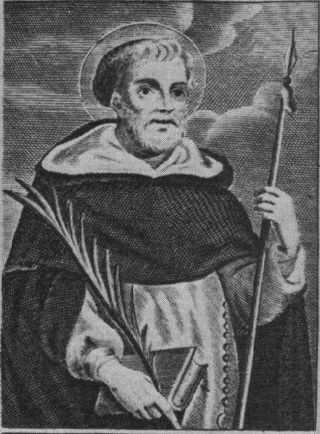Related Research Articles
Julius (I) from the kindred Kán was a powerful Hungarian baron and landowner, who held several secular positions during the reign of kings Emeric, Ladislaus III and Andrew II. He was the ancestor of the gens Kán which originated from Baranya County.

Julius (I) from the kindred Rátót was a powerful Hungarian baron and landowner, who held several secular positions during the reign of kings Andrew II and Béla IV. He was the founder of the gens Rátót's economical and political power.

Csák (I) from the kindred Hahót was a Hungarian noble who held several secular positions during the reign of King Béla IV. Initially, he was a strong and influential supporter of the king's son, Duke Stephen, later returned to Béla's allegiance.

Buzád II Hahót, O.P., also Buzád the Great or Buzád the Elder, was a Hungarian nobleman and soldier, who was the first known Ban of Severin. He later gave up his position in society and entered the Dominican Order.
Denis, son of Ampud, also Denis, son of Apod, was an influential baron in the Kingdom of Hungary in the first decades of the 13th century. He was Master of the treasury between 1216 and 1224. He was also ispán of at least three counties.
Nicholas was an influential Hungarian lord in the Kingdom of Hungary, who served as Palatine of Hungary twice during the reign of Andrew II of Hungary.

Martin from the kindred Hont-Pázmány was a Hungarian influential lord in the Kingdom of Hungary, who served as Judge royal in 1214, during the reign of Andrew II of Hungary.
Atyusz was the name of a gens in the Kingdom of Hungary, several prominent secular dignitaries came from this kindred.
Lawrence from the kindred Atyusz was a Hungarian noble, who served as Judge royal for a short time in 1222, during the reign of Andrew II of Hungary.
Batiz from the kindred Negol was a Hungarian noble, who served as Judge royal from 1222 until his death, during the reign of Andrew II of Hungary.
Atyusz III from the kindred Atyusz was a Hungarian influential baron, the most outstanding member of his family, who served as Judge royal from 1215 to 1217, during the reign of Andrew II of Hungary.
Pousa from the kindred Bár-Kalán was a Hungarian noble, who served as Judge royal for a short time in 1222, during the reign of Andrew II of Hungary.

Ladislaus I from the kindred Kán was a powerful Hungarian baron, who held several secular positions during the reign of kings Andrew II and Béla IV.

Demetrius I from the kindred Csák was a Hungarian baron, who held secular positions during the reign of kings Andrew II and Béla IV.
Atyusz from the kindred Hahót was a Hungarian noble, who served as ispán of several counties in the second half of the 13th century. He was also the ancestor of the Szabari noble family.
Michael (I) from the kindred Hahót was a Hungarian noble, who served as ispán of Varaždin County in 1244.
Thomas was a Hungarian prelate in the first half of the 13th century, who served as Bishop of Eger from 1217 to 1224, then briefly Archbishop of Esztergom in 1224. He participated in the Fifth Crusade.
Pat (I) from the kindred Győr was a Hungarian influential lord at the turn of the 12th and 13th centuries, who served as Palatine of Hungary from 1209 until 1212.
Michael, son of Ampud was a baron in the Kingdom of Hungary in the first decades of the 13th century, who served as Ban of Slavonia in 1224.
Negol (Nygol) was the name of a minor gens in the Kingdom of Hungary, which possessed lands in the southern parts of Transdanubia, mainly Baranya County.
References
- ↑ Zsoldos 2011, p. 29.
- ↑ Engel: Genealógia (Genus Atyusz)
- ↑ Nemes 2006, p. 23.
- ↑ Markó 2006, p. 287.
- 1 2 Nemes 2006, p. 27.
- 1 2 3 4 5 Nemes 2006, p. 26.
- 1 2 3 Markó 2006, p. 270.
- ↑ Zsoldos 2011, p. 62.
- ↑ Zsoldos 2011, p. 174.
- ↑ Zsoldos 2011, p. 43.
- ↑ Zsoldos 2011, p. 169.
- 1 2 Zsoldos 2011, p. 44.
- ↑ Zsoldos 2011, p. 231.
- ↑ Rudolf 2023, pp. 63–64.